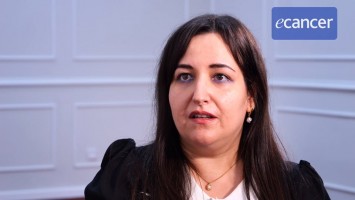Everybody knows that inflammatory breast cancer is one of the toughest breast cancers that we treat, usually they are locally advanced at presentation. Usually they tend to have metastases also at presentation or early in the course of the development of the disease. This entity has been identified early in the twentieth century, it was around 1920 or 1925, but until today we only know that it is very aggressive but we don't have clues to how to treat them, particularly as a precise entity. In the United States it's 2.5% of the breast cancer patients but in the region, and mainly it has been published a lot in Tunisia, it was around 30% or 40% twenty or thirty years ago. The incidence has dropped currently to nearly 5-6% which is still three times the incidence of Western countries, most probably because of the improvement in the socioeconomics of the countries of the region. We don't have any other statistics in the region to say exactly how much it is inflammatory breast cancer.
What we have done recently and what everybody has done recently is try to go into the molecular biology and to try to go to see the genomics of those patients, if those inflammatory breast cancers have a certain profiling which might give us clues on how to treat those patients. We have learned three things: we have learned first that they have a high tumour mutation load when we compare them to non-inflammatory breast cancer. The mutation or the genomic signature that we have most is the TP53 alterations. We have also learned that the microenvironment acts a lot in the development of inflammatory breast cancer and there is a role for macrophages and there is a role for mesenchymal stem cells. So there is a lot to do and to explore in those three directions in order maybe to develop later on more targeted treatments or more tailored treatments to those patients.
We know that usually they are hormone receptor negative so we lose all the magnitude of treating them with anti-hormone treatment and everybody knows that we have a lot of advances which came recently in hormonal treatment. Unfortunately we cannot take advantage of those advances. In the chemotherapy we know that usually they are resistant to chemotherapy so we are left with nearly nothing special to do with this entity.
Have there been any presentations from the conference that have sparked your interest?
From the conclusions of all these, what we have said already, the only practical conclusions that we can say today is that because of the high tumour burden of the mutations, tumour mutation burdens, there is a role most probably of using checkpoint inhibitors and immunotherapy in the treatment of those patients. There are few clinical trials that have been published, all of them are phase I or early phase II trials. The most promising seems to use a combination of immunotherapy with chemotherapy, so using both immunotherapy and chemotherapy. There is at least one publication with nearly 30-35% of response rate in this particular publication but there were a very small number of patients, these were twenty or thirty patients out of there. But we might see in it a recommendation in order to develop more maybe combinations, combinations based on immunotherapy. So currently today or tomorrow this might be the conclusion of what we have discussed today. When we have an inflammatory breast cancer we need to perform molecular biology, evaluation and genomics on those patients in order to identify targets and eventually propose those patients immunotherapy combined with chemotherapy. But there is still a lot of work to do.
Any final thoughts?
As everybody else, I am enjoying a lot participating with this conference. This conference has been here around for ten years, I participated personally in nine of those conferences. It has been increasing and improving all over the years. People in our region will wait for this conference because I am saying, and I know that everybody thinks the same, this is most probably the most important breast conference, dedicated breast cancer conference, to be done in the region on a yearly basis. And it is done in collaboration with multiple international associations like the American Society of Clinical Oncology, the European Society of Clinical Oncology and the societies of all the Arab worlds like the Arab Association for Medical Cancer Physicians. So I highly recommend this conference for our colleagues to participate and I hope that we will have a lot of years to go.








